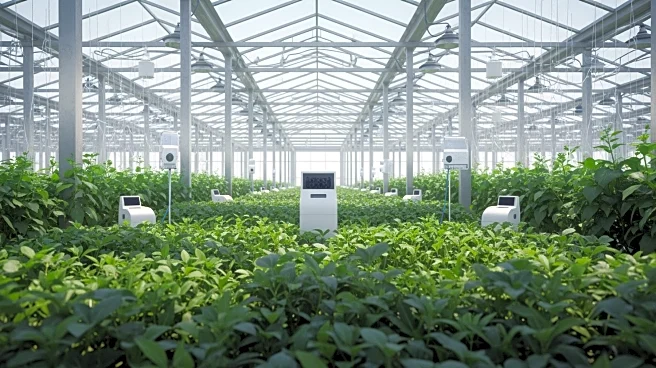What's Happening?
The Department of Science and Technology (DOST) Davao is advancing sustainable agriculture through the introduction of smart farming technologies. These innovations, showcased by the Southern Mindanao Agriculture, Aquatic and Resources Research and Development
Consortium (SMAARRDEC), aim to integrate data, automation, and artificial intelligence into farming practices. Key technologies include Zappify, an IoT-based pest control device that automates pest detection and management, reducing pesticide use and operational costs. Additionally, multispectral imaging is employed to provide detailed insights into plant health and soil conditions, enabling precise agricultural decisions. Another notable innovation is INDAI, which uses AI to assess the quality of durian fruits without invasive methods, ensuring consistency and quality assurance for growers.
Why It's Important?
These smart farming technologies are crucial for addressing challenges such as climate change, market demands, and resource constraints in agriculture. By reducing chemical pesticide use and optimizing resource management, these innovations contribute to environmental sustainability and economic efficiency. Farmers stand to benefit from increased yields and reduced costs, while the broader agricultural sector gains from enhanced competitiveness and sustainability. The integration of AI and IoT in farming practices exemplifies how technology can transform traditional agriculture, ensuring better harvests and a more resilient future for the industry.
What's Next?
DOST Davao's initiatives highlight the importance of bridging the gap between research and practical application in agriculture. As these technologies are adopted, farmers and rural communities are expected to experience significant improvements in productivity and sustainability. Continued support and development of such technologies will be essential for maintaining the momentum towards smarter and more sustainable agricultural practices. Stakeholders, including government agencies and agricultural organizations, may focus on expanding these technologies to other regions and crops, further enhancing the impact on the agricultural sector.
Beyond the Headlines
The introduction of smart farming technologies by DOST Davao underscores the potential for science and innovation to drive significant changes in agriculture. These developments may lead to long-term shifts in farming practices, promoting a culture of data-driven decision-making and environmental stewardship. Ethical considerations, such as the reduction of chemical use and the promotion of sustainable practices, align with global efforts to combat climate change and ensure food security. The success of these technologies could inspire similar initiatives in other sectors, fostering a broader adoption of technology-driven solutions.















